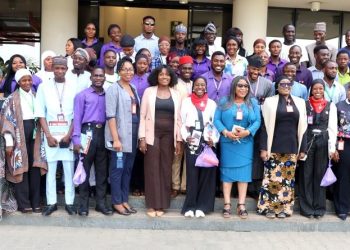By Nkechi Eze
The Economic and Financial Crimes Commission (EFCC) has refuted claims of inefficiency and service failure within the Special Control Unit Against Money Laundering (SCUML), describing a recent editorial by The Vanguard as misleading and inaccurate. The editorial, titled “EFCC’s SCUML Certification Conundrum”, was published on Tuesday, July 29, 2025, and questioned the effectiveness of SCUML’s registration process.
Responding in an official statement signed by its spokesperson, Dele Oyewale, the EFCC clarified that SCUML remains fully functional, with an effective and accessible online portal for certificate registration. According to Oyewale, the portal currently receives an average of 600 applications daily across the country, underscoring its robust usage and national relevance.
“The EFCC is sensitive to the significance of SCUML’s responsibilities and services to the nation. To this effect, the portal for online registration for SCUML’s certificate is accessible, functional, and effective,” Oyewale stated.
He explained that the Unit regularly updates its digital infrastructure to ensure a seamless experience for users. The application process, he noted, is straightforward with clearly outlined requirements, including document size and format specifications. Contrary to the claim that users are limited to uploading a single file, the EFCC clarified that the portal accommodates multiple uploads.
“Registration for certificates has been simplified for applicants with their complete documents,” the statement read. “The turnaround time for the issuance of certificates to successful applicants has been cut to between two to three days.”
Highlighting SCUML’s operational success, the EFCC referenced the latest ranking by the Presidential Enabling Business Environment Council (PEBEC), which rated SCUML third among all public service entities in Nigeria. The unit was also recognized as one of the top-performing agencies in terms of public service delivery and business transparency, in line with PEBEC’s vision to ease business operations across the country.
Oyewale also addressed the editorial’s reference to issues such as “vague messages” and “illegible documents” encountered during the registration process, clarifying that such notifications are automated responses triggered when applicants fail to follow prescribed instructions.
“These are digital responses to errors committed by applicants who failed to adhere to instructions outlined on the portal and initiated registration in defiance of established protocols,” he said.
The EFCC further disclosed that many failed applications were traced to the use of non-functional email addresses, incomplete information, and conflicting data, challenges largely stemming from applicants’ poor digital literacy. To address this, SCUML has initiated various sensitization campaigns via the media and organized stakeholder workshops nationwide. Its helplines remain open to guide applicants facing difficulties with the portal.
In pursuit of continuous improvement and innovation, the EFCC revealed plans to launch digital animation guides in Hausa, Igbo, and Yoruba within the coming weeks. These will offer step-by-step tutorials for completing SCUML’s online registration process. Additionally, the Unit is reviving its public awareness campaign through radio and television jingles to further extend its reach, especially at the grassroots level.
“Continuous process improvement and excellent service delivery are a core value of SCUML. Over the years, it has consistently worked to improve customers’ experience through innovation,” the EFCC affirmed.
While acknowledging the public’s right to demand efficient service delivery from government institutions, the Commission urged that such concerns be based on verifiable and genuine complaints.
“The EFCC is globally respected for its professionalism and commitment to excellence. SCUML is offering top-of-the-range services and will continue to improve on its processes in the overall interests of Nigerians,” Oyewale concluded.
















